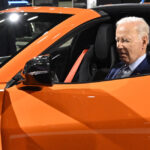Energy News Beat
A coalition of nearly 4,000 auto dealers on Tuesday sent a letter to President Joe Biden explaining why his plans to force Americans into electric vehicles are unworkable.
The bottom line: Despite subsidies to car manufacturers to make the EVs, and tax credits for drivers to buy the cars, only 7% of new vehicle sales are electric vehicles, compared with Biden’s goal of 60% in 2030 and 66% in 2032.
The auto dealers wrote that “the supply of unsold [battery electric vehicles] is surging, as they are not selling nearly as fast as they are arriving at our dealerships—even with deep price cuts, manufacturer incentives, and generous government incentives.”
Their letter follows the announcement last month from GM and Ford that they are cutting back on projections of EV sales and lowering production targets for the cars and batteries because Americans prefer to buy other cars.
Ford Chief Financial Officer John Lawler, who postponed $12 billion in EV investments, said, “Given the dynamic EV environment, we are being judicious about our production and adjusting future capacity to better match market demand.” Similarly, GM described “evolving EV demand” as a reason for slowing production of electric pickup trucks.
Ford and GM describe EV demand as “dynamic” and “evolving,“ but in reality, it is static and devolving.
Auto dealers are getting stuck with the unwanted cars. Dealers have to pay in advance, and if the cars sit on the lots without being sold, their funds are tied up, and they don’t have room for better-selling vehicles.
Because Congress will not pass laws mandating purchases of EVs, Biden has proposed regulations from the Department of Transportation and the Environmental Protection Agency. These regulations would penalize automakers for selling gasoline-powered cars. California is going further, requiring all new-vehicle sales to be electric after 2035.
But, as the dealers say in their letter, “Some customers are in the market for electric vehicles, and we are thrilled to sell them. But the majority of customers are simply not ready to make the change.”
There are reasons that most Americans prefer to buy cars with internal combustion engines. The primary one cited is the difficulty of charging while on long trips or in homes that don’t have charging stations.
Most people who love their EVs recharge them at home overnight. But not everyone has a garage at home. Some live in apartments and homes without garages. Many of those people have to rely on charging stations for their EVs if they can’t run extension cords from their residences to the parking lot.
There are few charging stations in rural areas, where driving distances are longer.
Also, while gasoline-powered cars can be refueled in five or 10 minutes at a gas station, recharging an electric vehicle can take 45 minutes or longer for a full charge. Wait times are longer if someone else is at the charging station, and if some charging stations are out of order. Most people don’t want to let their EV battery go below 20%, and the charging rate goes down when it is charged over 80%.
In addition, batteries lose range in cold weather. A study by truck manufacturer Autocar shows that electric vehicles lose, on average, a third of their range in the winter, which reduces the typical 240-mile range to 160 miles. If a heat pump is added to the car, the loss is less, but still, the 240-mile range would shrink to 180. Only 380 North Dakota residents chose EVs in 2021, and Alaska had just 1,300.
New electric vehicles also cost more than gasoline-powered vehicles. The electric version of the base version of the Ford F-150 pickup truck, the best-selling vehicle in America, costs an additional $26,000. And Tesla’s base prices start at about $40,000 for a Model 3 and go up to almost $100,000 for a Model X.
Few Americans can afford these vehicles.
Dealers also cite lack of minerals available for EV batteries as a reason for pausing on the push for electrification. China has most of the minerals for batteries, and almost 80% of batteries are made in China. China is buying up many of the world’s mines where rare earth minerals used in batteries are found.
The forced push to EVs is making America weaker and China stronger.
Should Biden’s EV goal come to pass, America would become more dependent on China for electric batteries and associated components, rather than using abundant domestic oil and natural gas. That means sacrificing energy independence.
The Biden administration’s push for EVs is to supposedly reduce greenhouse gas emissions. But in order to produce supplies of batteries for EVs and other components, China is increasing its construction of coal-fired power plants. America has 225 coal-fired power plants (which the Biden administration is trying to put out of business), and China has 1,118 (half of all the coal-fired plants in the world).
Research by Kevin Dayaratna, chief statistician and senior research fellow at The Heritage Foundation, has shown that even completely eliminating all fossil fuels from the United States would result in less than 0.2 of a degree Celsius in temperature mitigation by the year 2100. (The Daily Signal is the news outlet of The Heritage Foundation.)
Biden says that EVs will reduce greenhouse gas emissions and that regulations on tailpipe and power plant emissions reduce global warming. But that’s a fantasy. Emissions will not be reduced until the biggest producers of so-called greenhouse gases—China, India, and Russia—reduce their emissions, which they show no signs of doing.
The dealers conclude their letter: “Mr. President, it is time to tap the brakes on the unrealistic government electric vehicle mandate. Allow time for the battery technology to advance. Allow time to make [battery electric vehicles] more affordable. Allow time to develop domestic sources for the minerals to make batteries.”
They are speaking not only for themselves, but for the vast majority of American drivers.
ENB Top News
ENB
Energy Dashboard
ENB Podcast
ENB Substack
The post Auto Dealers Call on Biden to Hit Brakes on Unrealistic, Unachievable Electric Vehicles Mandate appeared first on Energy News Beat.








